
The 3rd National Development Forum organized by the National School of Development at Peking University (NSD) was held at Yingjie Exchange Center of Peking University (PKU). The theme of the Forum was “Reform and opening up in the course of national development”.
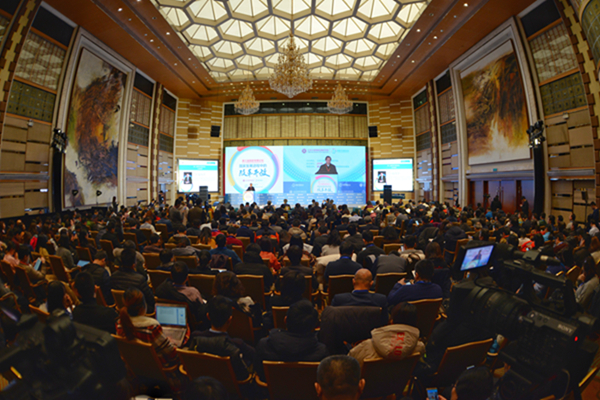
On-site at the Forum
Gao Shangquan, former Honorary President of China Society of Economic Reform and former Vice Minister of the State Commission for Restructuring Economic Systems, and Professor Justin Yifu Lin, Honorary Dean of NSD were respectively, the keynote speaker and the speaker at the closing ceremony of this event. The Forum comprised two sessions - “40 years of reform and opening up” in the morning and “40 years of enterprise reform, innovation and development” in the afternoon - and numerous renowned scholars and entrepreneurs with outstanding achievements were invited to share their views and experience on the significant changes and development reform brought to Chinese society and enterprises.
Shouldering a historic mission, scholarship transformed China
PKU Vice President Wang Bo said that NSD, a national and PKU think tank, by summing up past experiences and contributing academic wisdom to the future of national development in the form of a high-end forum at the cusp of the 40th anniversary of the reform and opening up bore great value and significance. China saw unprecedented opportunities and faced enormous challenges in 2018. NSD must continue to conduct in-depth research in multiple disciplines and provide academic support to national development.
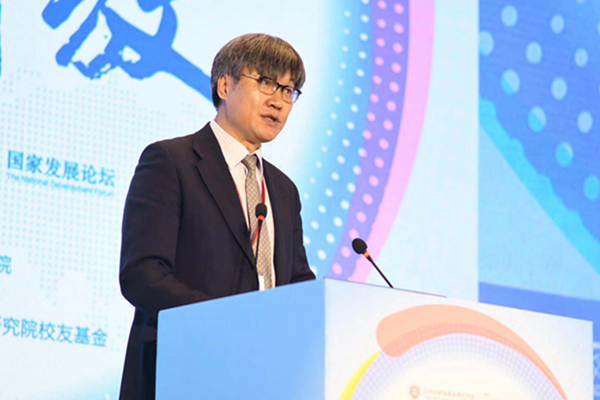
Wang Bo addressing the Forum participants
Yao Yang, Dean of NSD, presented a retrospect of NSD’s professors and the organization itself as they grew and weathered storms together in the course of the reform and opening up. He said that NSD would shoulder the significant historic mission of “scholarship transforming China and the world” firmly centered on scholarship.
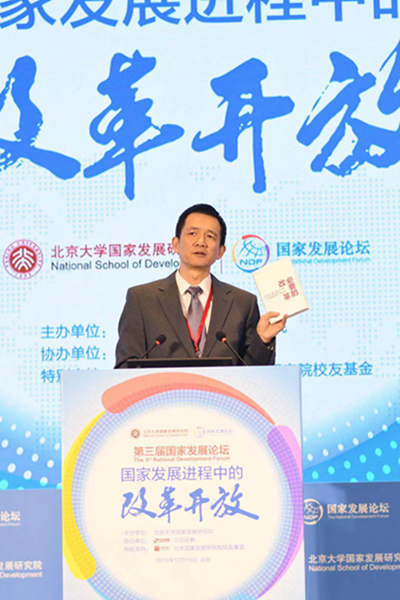
Yao Yang delivering his speech
Gao Shangquan, a personal reform experience: Four major stages and five significant historic changes in 40 years
Gao Shangquan experienced the reform personally. He reviewed the four major stages of the reform and opening up: 1) target exploration; 2) building a market economy; 3) preliminary establishment of the market economy; and 4) the new “Five-in-One” general planning; as well as the five significant historic changes that had occurred in the last 40 years, including: 1) from class struggle to economic construction; 2) transforming from a planned economy to a market economy; 3) from a closed and semi-closed economy to a fully open economy; 4) from rule by man to rule of law; and 4) from impoverished and backward to a comprehensive well-off society.
Looking forward, Gao Shangquan said that China must adhere to a firm basic economic system, a firm market-oriented reform direction, a firm modern enterprise system, as well as firm protection of the rights of the person, property rights and personal rights.

Gao Shangquan delivering his keynote speech
Expert panel discussion: Reform must make new strides
Wu Sikang, Secretary of the Leading Party Members’ Group and Director of the Development Research Center of Shenzhen Municipal People’s Government reviewed the experience of Shenzhen as the pacesetter of reform and opening up. Ma Jun, Director-General of the Enterprise Research Institute, Development Research Center of the State Council said that long-term investors that support innovation are imperative, and incentives for management to remain committed to the long-term growth of enterprises must be present as well; there should also be appropriate delegation of authority in corporate governance. Jia Kang, President of the China Academy of New Supply-side Economics and former Director of the Chinese Academy of Fiscal Sciences, Ministry of Finance, explored the ways to incentivize intellectuals with reasonable policies, and to allow intellectuals to play a greater role in the new era. NSD Professor Lu Feng explored the significance of macro policies and deeper reforms on China’s current economic growth from a macro perspective, and pointed out that making new strides in reform will help China better respond to pressures from the external environment.
Expert panel discussion
A business-academia dialogue: 40 years of enterprise reform, innovation and development
NSD not only offers advice and strategies to the country in the field of economics, nurturing elite leaders for businesses, and monitoring enterprise reform and innovation are also its key mission. At the round table presided over by Yang Zhuang, Co-Dean of BiMBA Business School at NSD, numerous entrepreneurs and scholars who monitor enterprise development took part in the discussion.
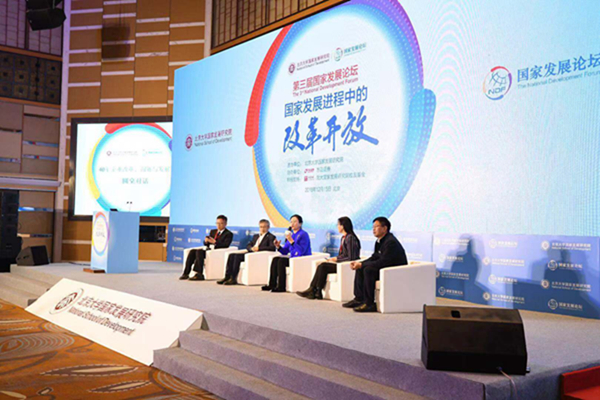
A business-academia dialogue
In particular, Xia Hua, Chairperson of Eve Group shared her story of leading numerous women embroiderers out of the mountainous regions of China toward fashion and lifting them from poverty in the process. Wang Baihua, Inspur Executive President and CTO presented Inspur Group’s proprietary innovations and their experience of boldly scaling new heights during the reform and opening up. Zhang Huarong, Chairman of Huajian Group, one of 100 outstanding private sector entrepreneurs in the 40 years of reform and opening up as well as EMBA alumni of NSD profiled the bold undertakings of a privately-run enterprise going abroad and bettering the lives of others in the wave of reform with a montage of photographs.
During the 40 years of reform and opening up, “unbinding” in terms of policy was part and parcel of enterprise growth. Ren Xingzhou, former Director-General and research fellow at the Institute for Market Economy, Development Research Center of the State Council, reviewed how China gradually eased price controls and injected new vitality into the market economy in the course of price reform in China. Professor Chen Chunhua, K. C. Wong Chair Professor at Peking University and Dean of BiMBA School of Business, used her new book Shunde 40 Years as the basis for analyzing Shunde’s development in tandem with the reform and opening up, and explored the roles the government and enterprises played in its development.
Justin Yifu Lin: A new era but reform is an ongoing process
In his speech at the closing ceremony, Justin Yifu Lin said that although China’s economy was confronted with many challenges in the new era, it still had great growth potential. The current enormous downward pressure was closely related to weak external demand. As a developing nation, China still had the advantage of a latecomer. By introducing technology and leveraging a relatively large market to develop an emerging Internet economy, China could still generate enormous economic vitality. As for the China-US trade war, Justin Yifu Lin believed that the US, by raising the duties on some of China’s exports, would adversely affect US consumers. Looking ahead, he advised China to continue to support globalization and deepen reform at the same time. (Reported by Zhang Tong)
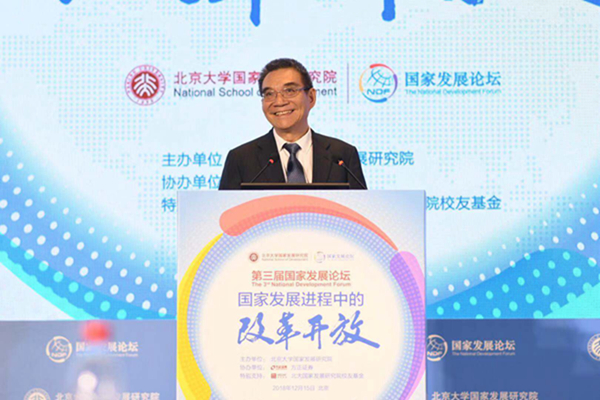
Justin Yifu Lin delivering his speech at the closing ceremony
About the National Development Forum:
Leveraging a national high-end think tank - the National School of Development at Peking University - with “Focus-National Development, Langrun-Knowledge based on Investigation” as the tenet, and rooted in China’s reform and development as well as modern practices, the National Development Forum provides a high-level exchange platform based on “key topics and policies relevant to national development”. It aims to systematically conclude major advances in national development, forecast changes in the global landscape related to the rise and fall of future growth of the nation, and to carry out discussions and exchanges on major strategies, systems and institutions as well as policies.